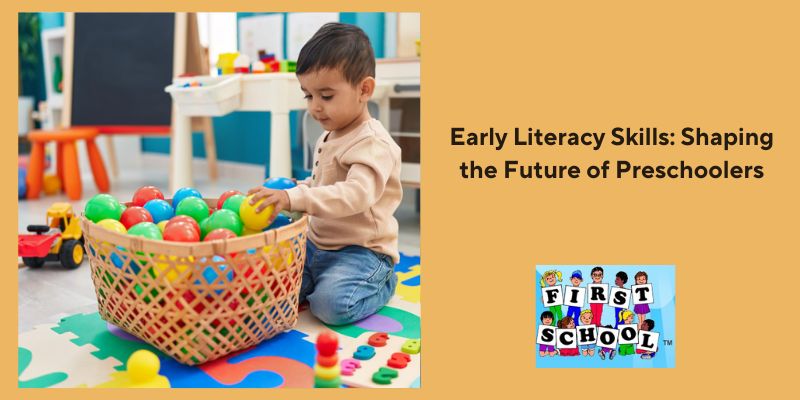Early Literacy Skills: Shaping the Future of Preschoolers

Early literacy skills refer to the development of language and foundational literacy skills in children from birth through the early years of schooling. It encompasses a range of abilities that form the basis for later reading and writing, including sound awareness, alphabet knowledge, vocabulary development, and comprehension skills.
Continue reading to explore the benefits of early literacy skills, factors contributing to its development, five components of early literacy, and the role of parents and early caregivers in promoting early literacy.
Benefits of Literacy Development in Early Childhood
According to United Way of Treasure Valley, by the age of 2, children who are given early literacy skills display greater language comprehension, vocabulary, and higher cognitive skills.
Early literacy offers myriad benefits that profoundly shape a child's development:
- Cognitive Development: Early literacy experiences stimulate brain development, critical thinking, problem-solving, and memory skills.
- Language and Communication Skills: Early literacy for preschoolers promotes language expansion, practical expression, and strong communication skills.
- Social and Emotional Development: Literacy activities, like shared reading, build social bonds and emotional understanding, equipping children with essential relationship skills.
- School Readiness: It enables children to participate in classroom activities and follow instructions actively.
- Lifelong Learning: These skills instill a love for reading and learning, creating a positive attitude toward education and stimulating continuous intellectual engagement.
Factors Contributing to Early Literacy Development
Several factors contribute to early literacy development in children:
- Home Environment: A literacy-rich home environment, characterized by exposure to books, storytelling, and conversations, is crucial in encouraging early literacy skills.
- Parental Involvement: Active parental involvement, including shared reading activities, discussions about stories, and encouragement of writing and drawing, positively influences literacy development.
- Early Experiences with Books: Early exposure to books and print materials helps children develop print awareness, letter recognition, and an understanding of the purpose of reading.
- Language Skills: Strong oral language skills, including vocabulary development, phonological awareness, and understanding of syntax and grammar, form the foundation for early literacy.
- Social Interaction: Social interaction, such as conversations, storytelling, and collaborative reading experiences, supports early literacy development.
- Play and Exploration: Play-based activities, such as pretend play, drawing, and storytelling, allow children to experiment with language, express themselves creatively, and develop narrative skills.
Five Main Components of Early Literacy Skills
The five components of early literacy, often referred to as the "Foundational Skills," are:
- Phonological Awareness: The ability to recognize and manipulate the sounds of spoken language, including phonemes, syllables, and rhymes.
- Phonemic Awareness: Understanding the conventions of written language, such as recognizing letters, words, and sentences, and understanding the purpose of print.
- Alphabet Knowledge: Knowing the names and sounds of letters and understanding their correspondence to written symbols.
- Vocabulary Development: Learning lots of words and knowing what they mean, both when someone says them and when you say them yourself.
- Narrative Skills: The ability to understand and tell stories, including understanding story structure, sequencing events, and making predictions.
Role of Parents and Early Care Givers in Guiding a Child to Literacy
Here are some specific ways parents and early caregivers contribute to a child's literacy development:
- Reading Aloud: Parents and caregivers can read to their children regularly, exposing them to various books and helping them build vocabulary and a love for reading.
- Conversation: Engaging in meaningful conversations with children helps develop language skills and enhances critical thinking and communication skills.
- Storytelling: Sharing family stories and encouraging children to tell them helps develop narrative skills, sequencing abilities, and creativity.
- Writing Activities: Providing opportunities for children to scribble, draw, and eventually write helps develop fine motor skills.
- Encouragement and Support: Praise and encouragement for children's literacy efforts and progress help build confidence and motivation to continue learning.
Final Thoughts
Early literacy skills are essential for preschoolers, laying the foundation for future academic success and overall development. Promoting phonological awareness, print awareness, alphabet knowledge, vocabulary development, and narrative skills in preschoolers, parents, caregivers, and educators can empower children to become proficient readers and writers. Through reading aloud, engaging in conversations, providing access to books, and encouraging writing and storytelling activities, you can create a literacy-rich environment that nurtures children's love for reading and sets them on a path toward lifelong learning and success.
Build Your Child’s Educational Foundation with First School
Enhance your child’s education by providing early literacy skills at First School. Our team of skilled and compassionate educators crafts an engaging curriculum that seamlessly blends play-based exploration with purposeful activities. We value collaborative relationships with parents, ensuring your active participation in your child's education.
Contact us today and learn more about how we can help your child thrive.
FAQ
-
How is early literacy different from emergent literacy?
Early literacy focuses on foundational skills developed from birth through preschool, while emergent literacy encompasses behaviors and experiences before formal reading and writing instruction begins.
-
When does early literacy start?
Early literacy begins from birth and continues through preschool, laying the foundation for future reading and writing skills.
-
Does early literacy only involve books, or are there other ways to do literacy?
Early literacy extends beyond books and involves storytelling, singing, playing with letters, and conversing.
-
What six areas do children need to develop to read fluently and automatically?
The six areas children need to develop to read fluently and automatically are phonemic awareness, phonics, fluency, vocabulary, comprehension, and spelling.
-
What are the three phases of early literacy learning?
The three phases of early literacy learning include emergent literacy, alphabet knowledge, and early reading and writing.
This entry was posted in Kids Learning and tagged emergent literacyliteracy development in early childhoodliteracy for preschoolers
Comments are closed









